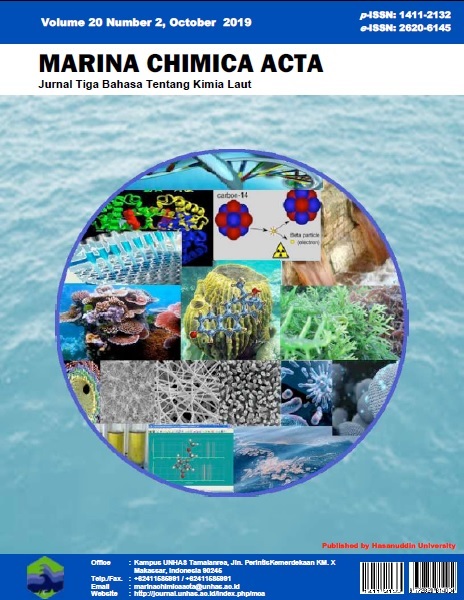EVALUATION OF THE BRINE PRESERVATION METHOD OF SEA GRAPES (Caulerpa lentillifera) AS A COMMERCIAL PRODUCT
DOI:
https://doi.org/10.20956/mca.v20i2.9269Abstract
The aim of this study is to evaluate this commercial product in relation to the preservation materials, the preserved product biomass, individual weight and length of the fronds, and the effect of soaking time and water temperatures on the frond “crispiness”. There was no significant difference between different soaking times (from 30s to 2 minutes) on the weight and the length of the fronds ANOVA (p=0.88) and (p=0.81) after the initial period. Furthermore, tap water and ice water treatments during rehydration process had no significant effect on the fronds crispiness (ANOVA p=0.560). These results show that the preserved product using high concentration of brine produces a product with consistent biomass, size, and amount of the fronds. However, the temperature of the freshwater used in rehydration has no effect on the quality of the product, in contrast to the claims made by the company on the packaging instructionsDownloads
References
Kudaka, J., Itokazu, K., Taira, K., Nidaira, M., Okano, S., Nakamura, M., & Ohno, A. (2008). [Investigation and culture of microbial contaminants of Caulerpa lentillifera (Sea Grape)]. Shokuhineiseigakuzasshi. Journal of the Food Hygienic Society of Japan, 49(1), 11-15.
Lako, J. V. (2012). Value adding and supply chain development for fisheries and aquaculture products in Fiji, Samoa and Tonga: seagrapes post-harvest and value addition in Fiji: progress report: Institute of Marine Resources, FSTE, USP.
Chiralt, A., Fito, P., Barat, J. M., Andres, A., González-Martınez, C., Escriche, I., & Camacho, M. M. (2001). Use of vacuum impregnation in food salting process. Journal of Food Engineering, 49(2), 141-151.
Wiley, R. C. (1994). Preservation methods for minimally processed refrigerated fruits and vegetables. In minimally processed refrigerated fruits & vegetables (pp. 66-134). Springer US.
Hurd, C. L., Harrison, P. J., Bischof, K., &Lobban, C. S. (2014). Seaweed ecology and physiology. Cambridge University Press.
Mizuno, M. (1984). Environment at the Front Shore of the Institure of Algological Research of Hokkaido University. Scientific papers of the Institute of Algological Research, Faculty of Science, Hokkaido University, 7(2), 263-292.
Bachmann, J., &Earles, R. (2000). Postharvest handling of fruits and vegetables. ATTRA

